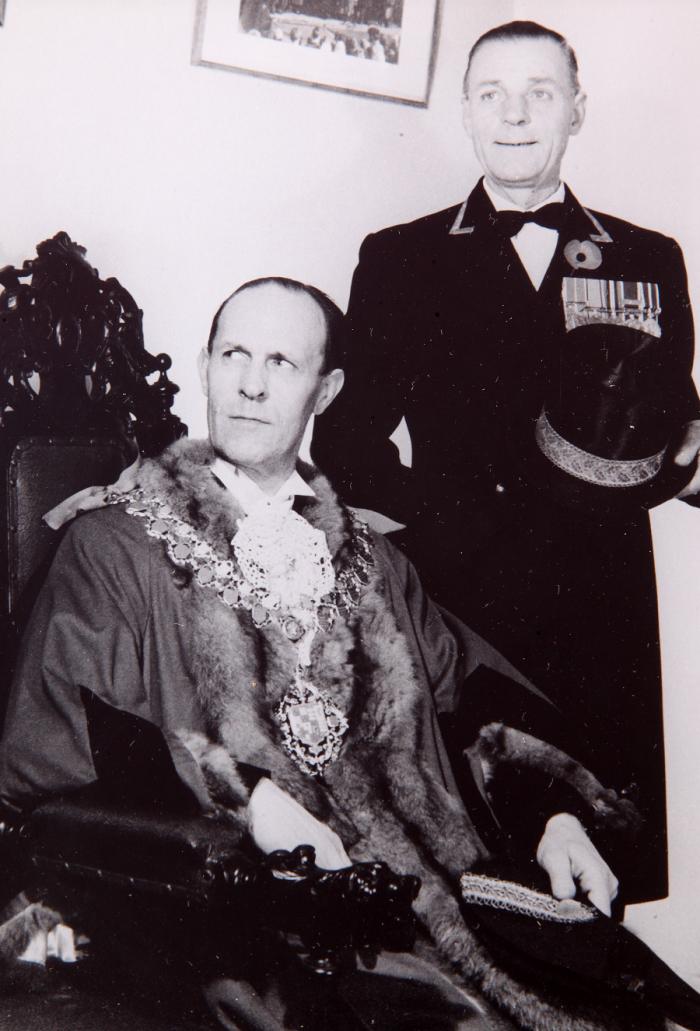Ernest Everitt Bland, known as Ernie, was born in Stoke Newington, London, March 8th 1913. His parents were Londoners, his father Ernest George Bland a printer for Waddingtons and he had a younger brother, Harold, born in 1916.
The two World Wars were very disruptive in his early life. His father was drafted into a Scottish Highland regiment, and he arrived at the family home after the war, dressed in a kilt. His older son of 5 years did not recognise him, and he was introduced to his baby son for the first time. There was another brother for Ernie, born after the war, called Leslie, and he died of diabetes aged 14 years.
Ernie’s education in London was not a happy one. At the age of 14 years, his family did not opt for him to apply for a scholarship to technical college. Instead, he left school and went to work to supplement the family income.
He went to work for Foster Brothers, a Birmingham based chain of men’s clothing shops. He worked at various shops in the East End of London and met Rita Frances Root, another shop worker, travelling to work on buses. Her father had been killed in WW 1. They married in 1937, and had two daughters, Daphne in 1939, and Wendy in 1941.
In 1947, when he was 34 years, he was offered and accepted the managership of Foster Brothers at 9/10 The Market Place, Wokingham. He remembered that Daphne cried on the train travelling to Wokingham from Waterloo, and on arrival their furniture was hoisted through the window of the flat over the shop, from the removal van in the Market Place. The rambling flat had no upstairs electricity, only gas-light, and no bathroom. There was an outside toilet. But there was a big garden to grow vegetables and keep chickens, Shop work was badly paid, and Rita also worked. Ernie’s daughters went to Palmer School, which was then behind houses in Rose Street, and went on to the Holt School.
Ernie had been a “Special Constable” in London during the war, and had joined choirs and amateur operatic groups there.
He became a Special Constable in Wokingham, joined the Chamber of Commerce, and the Baptist Church Choir, He was a founder member of the Wokingham Choral Society, and a member of East Berks Operatic Society. He was involved with the administration of the Air Training Corps in Wokingham. He joined the Liberal Party and was elected to the Town Council. He was elected Mayor in 1967, and decided to leave the council in 1970.
The family made friends, especially amongst the shop-managers of Wokingham, and were much involved with the yearly carnival. Ernie and Rita’s many relatives, brothers and sisters and their children, made happy visits to Wokingham, which they regarded as “the country”. They stayed in the Market Place flat, which had been given some much needed renovations.
In 1960, Foster Brothers demolished most of the building behind the Georgian frontage of no 9/10, Market Place, rebuilt the shop, and made the accommodation into two flats. Rita and Ernie moved to a house in Priest Avenue.
Ernie retired in 1978, and in 1983 moved to Henley to live near daughter Wendy and Grandchildren.
In 1997, he wrote his “Memoirs”, and died in Henley in 1999.
Here are some extracts from his memoirs:
“Wokingham is a medium-sized town about forty-five miles from London and when we went there it was a sleepy country town with a largely elderly population. I used to be an old coaching stop from London, and is now served directly by train from Waterloo. It is now an affluent commuter town and nothing like when we went there, except it still keeps the appearance of its old character buildings”
“In February 1952, King George VI died and with the police, I lined the funeral route at Windsor Castle. In 1953, we acquired our first television set, and were able to see the Coronation of the Queen in June, and we watched the roasting of an ox from our window in the Market Place”
“In 1967, we were chosen as the incoming Mayor and Mayoress of the Borough of Wokingham and started a hectic and exciting year.”
“I was able to establish a club for the hard of hearing in the town, and for several years I had been a Governor of St. Pauls Junior School, and later I acted for some time as their secretary. One function I had was to open the new sewage works which was the latest heat treatment plant, and they put a plaque over the door! The latest I have heard is that the plant is now obsolete, and the building derelict, so the last laugh is on me! It was a very rewarding year and we tried to give back to Wokingham some of the joy and kindness we had received since we came to the town in 1947”
“In 1970, I was up for election and decided I was trying to do too much, so did not stand for re-election.”
Wokingham Town Museum Unique Identifier: WTH0072

